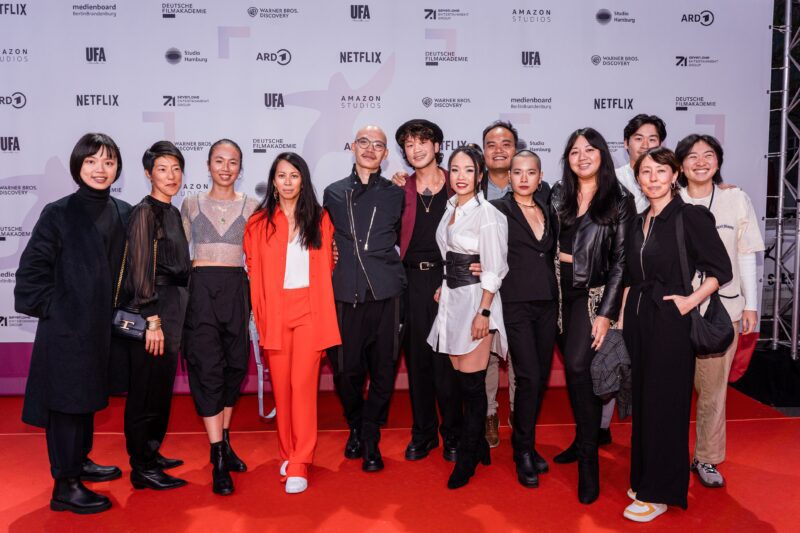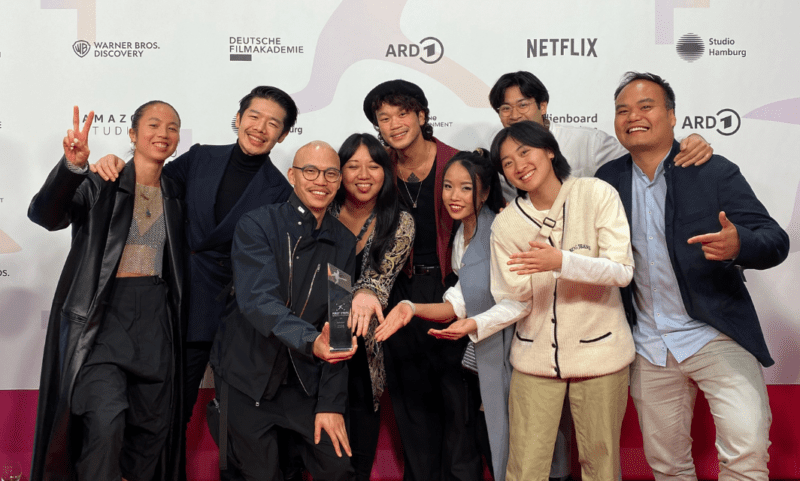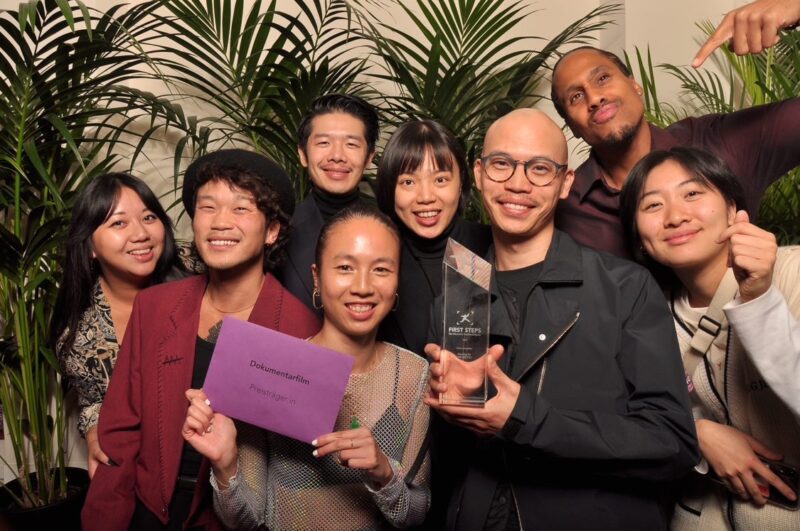
Each year, in early October, German filmmakers from different generations gather in Berlin to attend the FIRST STEPS Award—an award ceremony for up-and-coming filmmakers. In this annual competition, graduates from all film schools in German-speaking countries can apply with their graduation films to win prize money of up to €20.000. The categories range from feature to documentary to commercial films to the best young talent in acting, screenplay and camera. Apart from that, the award aids as a springboard into the industry. Organized by the German Film Academy, winners are also invited to become junior members. Through this, they can help select award winners for the German Film Prize, besides learning from industry mentors and contributing towards the advancement of German Film in Europe and beyond.
The Vietnamese German actors Yung Ngo as well as Trang Le Hong attended this year’s award ceremony as they came together to support their industry colleagues, such as their director friend Dieu Hao Do, who won the Best Documentary prize. While in 2021, two Asian diasporic women from the community already cleared two significant prizes (Monica Vanesa Tedja won the short film and Hien Mai won the documentary film category), this year felt particularly special, they said, as more Asian filmmakers were invited to and gathered at this year’s event.
“It was an insanely awesome evening and award show, I had a lot of fun. It was diverse and a lot of strong women were represented. There is no other event in Germany that I have been to that I can compare it with,” said Trang Le Hong, who has been acting for the last ten years. She was there for two reasons: to support Hao with his film Hao Are You and to support Merle Grimme with Clashing Differences, “which has a great cast including the actress Minh-Khai Phan-Thi. It was a big win for both films. I also loved that we took the picture together, that was a very powerful moment for me because we’ve never taken a picture on the red carpet with so many people from the Asian film community before.”

Yung Ngo, who has studied acting in Cologne, agreed as he joined the ceremony for similar reasons: “I’ve never seen so many Asian German filmmakers together, and seeing my best friend winning an award and being celebrated was very heartwarming.” Growing up, Yung was inspired by Tony Leung, who received the Golden Lion award for his lifetime achievement at the Venice Film Festival in September. It was the romantic classic In the Mood for Love by Wong Kar-Wai, he remembers: “He was the first person of Asian descent, who was not Bruce Lee or Jackie Chan, who were known by their martial arts, but Tony was known for his acting skills.” Later on, he also saw the host and actress Minh-Khai Phan-Thi on German TV and media more and more. “I think she was one of the first Asian person here who succeeded on the TV, movie, and entertainment business.” Trang names Minh-Khai as her role model, too, “Even our parents’ generation knew her and she was and is a Vietnamese face in the media. Seeing her on TV, she lived my dream job.”
Both reflected on the changes in the industry over the last 10 to 15 years and Trang feels very grateful as she didn’t embark on a traditional route of starting out in acting or film school. “I’ve definitely been very lucky in my career and I can say that now, compared to 10 years ago, there are more roles for people of color, even if the role has non-Asian names like Esther or Laura.” Instead of shying away from Asian actors and actresses, casting directors are more open to inviting Asians to audition and cast non-stereotypical roles with talents with migration backgrounds. “It’s a bit more progressive, even though you still feel their pressure.” It doesn’t come naturally to the casting directors, Trang says, sometimes she feels like people are trying to go with the diversity trend, and they cast an Asian person just to fill the quota. “Of course, not all projects are like that. There are projects that are very diverse from the inside and have a new way of thinking about casting diversity, but that’s by no means the rule.” Looking to the thriving Asian community, she feels hopeful and positive as there are more members carving out their own spaces and stories in the industry. “There is an Asian film community here where you can connect with lots of people who have great visions and are going in the same direction. It wasn’t the case 10 years ago. This year’s networking event Creating Community Connections in Film hosted by korientation was a highlight.”

Similarly to the Berlin Asian Film Network (BAFNET) that organizes film screenings and networking, korientation is a (post)migrant self-organization and a network for Asian-German perspectives with a socio-critical view of culture, media, and politics. Korientation has also been an anchor in creating Asian representation in film with their Asian Women’s Film Festival (AWFF) in 2007, which transformed into the Asian Film Festival in 2010. Another resource hard to miss is Asian German Updates who has been documenting Asian presences in German film; for example, take a look at the Black and Asian intersections in German film TV / history.
Consistent with Trang’s thoughts, Yung notices a similar shift in the industry here where Asian actors and actresses receive more human, multidimensional roles, “not just the supporting roles, but also leading parts. Above all, within the last five years, I can witness more Asian people behind the camera: producers, directors, directors of photography.” He recognizes that the community has bonded more deeply in the last years, “It’s about finding like-minded collaborators who have the same vision of expressing an Asian perspective here in the German industry.”
With or without representation by an agency, working as an actor/actress can still be challenging, as well-paid roles are rare and the future uncertain. Trang says that if you really love this métier, it’s about “sticking with it, not giving up and not despairing.” One of the biggest hurdles is the financial part, as “you never know what’s coming next,” and to continue to follow your dream despite it. Both Trang and Yung are hopeful and excited about the Asian film community. “I hope that we are growing bigger and stronger,” says Yung, to which Trang adds “I hope there are a lot more roles for Asian actors, that we aren’t playing cliché roles anymore.” She wants to be an inspiration for other Vietnamese kids sitting in front of the TV, so they can “look up to me and think: it’s cool to be Asian, it’s cool to be Vietnamese.” Although not a K-pop fan, she refers to examples such as BTS or Black Pink: “They are so visible in the media and children in kindergarten already look up to them, sing their songs, and find that it’s cool to be like them.”
As the Asian German film community grows and the people in it receive recognition, they are both looking forward to upcoming projects from the community, one of them is the BAFNET event during next year’s Berlin International Film Festival (Berlinale) in February.
 Born in Germany, Thị Minh Huyền Nguyễn is a Vietnamese artist-scholar and athlete. She started Gold to Green, an online publication and podcast at the intersections of health, running, sustainability and culture in 2011. Having studied and worked in New York City, Huyen has co-founded WocForward in Brooklyn (a monthly exercise club for and by women of color) and Wayv Run Kollektiv back in Berlin to elevate queer, Black and brown, underrepresented runners. When Huyen is not writing or running, she’s involved in anti-racism / empowerment projects such as ichbinkeinvirus.org and biwoc-rising.org.
Born in Germany, Thị Minh Huyền Nguyễn is a Vietnamese artist-scholar and athlete. She started Gold to Green, an online publication and podcast at the intersections of health, running, sustainability and culture in 2011. Having studied and worked in New York City, Huyen has co-founded WocForward in Brooklyn (a monthly exercise club for and by women of color) and Wayv Run Kollektiv back in Berlin to elevate queer, Black and brown, underrepresented runners. When Huyen is not writing or running, she’s involved in anti-racism / empowerment projects such as ichbinkeinvirus.org and biwoc-rising.org.
 Trang Le Hong was born in 1987. Trang is a Vietnamese-German actress and known for Club Las Piranjas (2022), Barrys Barbershop (2021), and Wir sind jung. Wir sind stark (2014). (Photo: Thị Minh Huyền Nguyễn)
Trang Le Hong was born in 1987. Trang is a Vietnamese-German actress and known for Club Las Piranjas (2022), Barrys Barbershop (2021), and Wir sind jung. Wir sind stark (2014). (Photo: Thị Minh Huyền Nguyễn)
 Yung Ngo was born on February 11, 1987 in Stadthagen, West Germany. He is an actor, known for Prey (2021), Dogs of Berlin (2018), and You Are Wanted (2017).
Yung Ngo was born on February 11, 1987 in Stadthagen, West Germany. He is an actor, known for Prey (2021), Dogs of Berlin (2018), and You Are Wanted (2017).


